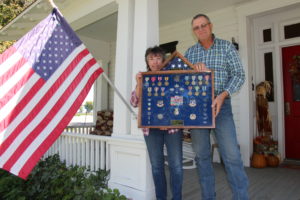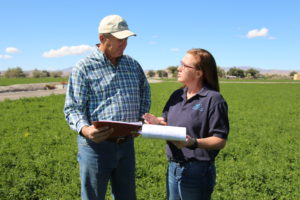
After serving over three decades in the Air Force, Bill Renfroe retired and began farming in northwestern Nevada.
Story & Photo Credit: Heather Emmons, USDA
Bill Renfroe is an Air Force veteran in Lovelock, Nevada, who can now add “beginning farmer” to his resume. While Bill had initially dreamt of retiring somewhere green, that vision enfolded into fields of green alfalfa in northwestern Nevada.
Life After the Air Force
Growing up on a dairy farm in nearby Fallon, Nevada, Bill got up at 3 a.m. and worked hard to grow alfalfa. He joined the Air Force at the recommendation of a friend. To Bill, it sounded like a good break from the rigor of the dairy farm and a great opportunity for he and his young wife, Vivian, who were expecting their first child.
His career spanned nearly 37 years, and he retired as a full colonel. He’s worked several overseas assignments, at the Pentagon, and rounded out his career working for the Chairman of the Joint Chiefs of Staff.
With Vivian at his side, they’ve lived in 23 homes, including Portugal, Germany and two places in England. When Vivian wanted to spend her retirement back in Nevada, Bill never imagined that he’d end up a farmer.
The couple bought some land in Lovelock and renovated the historic 1913 home that sits on the property. A commercial farmer worked the alfalfa fields for a few years, but opted to retire, leaving Bill with a decision to make.
“The opportunity was there. I bought some equipment and started farming myself,” said Bill. “I never thought I was going to be a farmer ever again. But it gives me something to do, and I found I enjoyed it, so I’ve grown.”

Bill utilizes USDA programs to manage water and risk on his farm.
On a Mission with USDA
Bill protects his native grasses through the Noninsured Crop Disaster Assistance Program offered by USDA’s Farm Service Agency. The program provides coverage for noninsurable crops when low yields, loss of inventory, or prevented planting occur due to natural disasters.
After learning more about USDA programs, he enrolled in the Environmental Quality Incentives Program when Christie Scilacci, a district conservationist for USDA’s Natural Resources Conservation Service, looked at his property and discussed benefits offered to beginning farmers and veteran farmers.
“Between Bill’s two properties, he has 320 acres in alfalfa production,” said Christie. “Water is a precious commodity in this area, and his headgates and crossgates were dilapidated, allowing water to leak out of the old gates. Through EQIP, he was able to replace and install new ones.”
In Lovelock, farmers are allocated water and use flood irrigation to irrigate their fields. Bill has clocked a significant time savings with his new headgates and crossgates.
“Watering the 200 acres at my one property is now 40-48 hours quicker every time, which can result in an entire extra irrigation every year,” said Bill. “This is the first time I’ve ever been able to water a fourth crop. And I still have water left over, which means more water stays in the dam for next year. During limited water years it will keep my plants alive.”

When Bill’s wife Vivian wanted to spend her retirement back in Nevada, he never imagined that he’d end up a farmer.
Serving Local Producers
Bill served as a member of his local FSA county committee.
County committee members are farmers elected by their peers to serve as a direct link between the agricultural community and USDA. Farmers on the committee help deliver FSA farm programs at the local level, help decide the kind of programs their counties will offer and work to make FSA agricultural programs serve the needs of local producers.
Ballots for the 2019 county committee elections were mailed the week of Nov. 4. Ballots must be returned or postmarked by Dec. 2.
More Information
USDA offers a variety of risk management, disaster assistance, loan, and conservation programs to help agricultural producers in the United States weather ups and downs in the market and recover from natural disasters as well as invest in improvements to their operations. Learn about additional programs.
For more information about USDA programs and services, contact your local USDA service center.
For an interactive version of this blog, visit #FridaysOnTheFarm.





